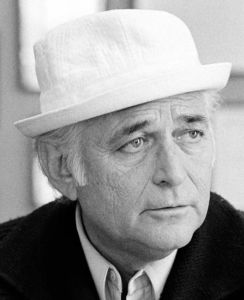Culture-Critiquing Sitcom Mogul Norman Lear Finally Gives Up the Ghost, by Jim Goad
It took 101 years, but television producer Norman Lear — who probably influenced American culture more than any other single figure in the 1970s — finally decided last Tuesday that it was time to die.
Lear was said to have written, created, or produced over 100 shows over his lifetime. But he was mostly known for his massively successful and monstrously subversive sitcoms of the 1970s:
All in the Family (1971-1979)
Based in part on a British sitcom called Till Death Do Us Part, which hinged on the comedic tension between a cranky Tory and his socialist son-in-law, Lear’s iteration transplanted these characters into Queens, New York, where bigoted Protestant dockworker Archie Bunker (Carroll O’Connor) endlessly squabbled over cultural issues with his Left-leaning hippie college-student son-in-law Mike “Meathead” Stivic (Rob Reiner before he became physically obese and politically insufferable).
All in the Family suffered dismal ratings when it debuted on Tuesday nights in January of 1971, but it became an American pop-culture phenomenon in its second season after it was moved to an 8 PM time slot on Saturday nights. At least in Philadelphia, the show kicked off a stellar Saturday-night lineup on CBS from 8 to 11 PM that included, in order, All in the Family, M*A*S*H, The Mary Tyler Moore Show, The Bob Newhart Show, and The Carol Burnett Show. As a kid, I don’t recall anyone who didn’t watch All in the Family. A friend’s dad who had to work on Saturday nights would have his wife make a cassette recording of the show just so he could listen to it when he got home on Sunday morning.
Archie Bunker was played as a buffoon and was not rendered as stupid, nor nearly as malevolent, as the murderous working-class douchebag Joe Curran as portrayed by Peter Boyle in Norman Wexler’s 1970 redneck horror movie Joe. But he was ritually outsmarted and made to look foolish by blacks, gays, women, and Jews. As the show ended its run in 1979, O’Connor continued in the same role in Archie Bunker’s Place, which ran until 1983 and gradually saw Archie become more “humanized” — i.e., humbled and put in his place by his rapidly diversifying surroundings.
Sanford and Son (1972-1977)
Based on another British sitcom called Steptoe and Son, which was about a father-son team of London junk dealers, Lear placed the two main characters in Watts and cast notoriously foul-mouthed black standup comic Redd Foxx as Fred Sandford and Demond Wilson as his son Lamont. It was the first TV sitcom to have an almost entirely black cast since The Amos ‘n’ Andy Show of the early 1950s, with the major difference being that Fred and Lamont Sanford were not portrayed as moronic, pickaninny stereotypes.
Maude (1972-1978)
In the first of Lear’s spinoff shows from All in the Family, Bea Arthur (born Bernice Frankel) portrayed Edith Bunker’s cousin Maude Findlay, a militant Left-wing feminist who represented everything that Archie Bunker resented. In a controversial two-part episode, Maude had an abortion.
Good Times (1974-1979)
This spinoff of Maude found Maude’s black maid Florida Evans (Esther Rolle, a uniquely ugly black woman) struggling along with her family against poverty and racial hatred in a Chicago housing project. It has been described as “the first television show centered on an African-American nuclear family.” The show’s title was purposely ironic, as the theme song’s lyrics described a family beset with “temporary layoffs” and “easy credit rip-offs” but, to my knowledge, it never portrayed any of the credit shysters as Jewish. Speaking of rip-offs, a black screenwriter named Eric Monte, who had written one script for All in the Family, successfully sued Norman Lear for plagiarizing his concepts for both Good Times and The Jeffersons, but only received a settlement for $1 million and a tiny percentage of residuals for Good Times, while Lear, who died with an estimated net worth of $200 million, subsequently blacklisted Monte from working in Hollywood.
The Jeffersons (1975-1985)
As Archie Bunker’s black neighbor George Jefferson, Sherman Hemsley was as joyously anti-white as Archie was anti-black, and their verbal parrying was as enjoyable to watch as the legendary 1970s encounters between Howard Cosell and Muhammad Ali. In 1975, Lear gave George Jefferson and his wife Louise (AKA “Weezie,” played by Isabel Sanford, who resembled a water buffalo with tits) their own sitcom. As a way of putting the stuck-in-his-blue-collar-until-death Archie Bunker in his place, George Jefferson used his success as the owner of a dry-cleaning business to “move on up” out of Queens to a “deluxe apartment in the sky” on Manhattan’s Upper East Side. To stick the dagger in a bit further, George’s apartment building was serviced by a white doorman (Ned Wertimer). Louise Jefferson befriended an interracial couple named Tom and Helen Willis (the white Franklin Cover and the black Roxie Roker), who had two mixed children who George referred to as “zebras.”
One Day at a Time (1975-1984)
At a time in American history when divorce and single parenting were still considered scandalous, Lear foisted this comedy on the public about a divorced rural Indiana mother (Bonnie Franklin, who sported one of those hideously unfeminine 1970s bowl haircuts for girls that was popularized by the likes of Olympic skater Dorothy Hamill), Ann Romano, and her two teenaged daughters (Valerie Bertinelli and the serially perverse Mackenzie Phillips). Ann takes her daughters to the supremely bland Midwestern city of Indianapolis to forge an all-female life for themselves away from the evil clutches of the family patriarch, only to be endlessly battered by the pig-headed douchebaggery of apartment-building superintendent Dwayne Schneider (Pat Harrington). The show was remade in 2017, only with Hispanics.
Mary Hartman, Mary Hartman (1976-1977)
Although it didn’t have nearly the impact nor the success of All in the Family — in fact, advertisers found it so unsettling that Lear was forced to push the show into first-run syndication rather than have it broadcast on network TV — it may be the most subversive of all Lear’s sitcoms. It appeared to be an urban Jew’s live-action nightmare of how much dysfunction, stupidity, and nuttiness lurk in the rural white hinterlands. Cast in the rural and stupendously non-diverse town of Fernwood, Ohio rather than a major American metropolis, it focuses on the neuroses and perversions of middle Americans such as the title character (Louise Lasser), who receives a sexually-transmitted disease from her cheating husband Tom (Greg Mullavey). In the first episode alone, a serial killer murders an entire family in Fernwood (and their chickens), while Mary’s grandfather is revealed as the “Fernwood Flasher.” Toward the end of the first season, Mary has a nervous breakdown on live TV.
* * *
Norman Milton Lear was born in Connecticut to parents of Russian-Jewish descent. He was Bar Mitzvahed in his early teens. When he was well into his 90s, a friend said that he described himself as a “total Jew.”
Lear claimed that the event that drove him into a lifetime of political advocacy disguised as entertainment occurred at age nine, when he heard several radio shows by Father Charles Coughlin, the “anti-Semitic” Catholic priest who ruled American radio in the 1930s to a degree similar to how Lear’s sitcoms ruled American television in the 1970s. At his peak in the late 1930s, Coughlin’s radio programs, which railed against Jewish influence over American affairs, drew an estimated 40 million listeners weekly, which was a third of the entire country’s population, including the countless citizens who didn’t even own radios. At the peak of All in the Family’s reign in the 1970s, an estimated 60% of American TV sets would tune in on Saturday nights to watch a show created by Jews that portrayed straight white American males as the source of all the country’s problems.
According to Lear’s Wikipedia profile:
Before All in the Family, television sitcoms in the 1950s and 1960s generally portrayed white American family life as comfortable and avoided raising issues such as racial discrimination and patriarchy.
In a 2012 interview with The New York Times, Lear said that he found American sitcoms of the 1960s to be too oppressively white and problem-free:
You looked around television in those years, and the biggest problem any family faced was ‘Mother dented the car, and how do you keep Dad from finding out’; ‘the boss is coming to dinner, and the roast’s ruined.’ The message that was sending out was that we didn’t have any problems.
According to Kevin MacDonald in The Culture of Critique, Lear was a major player amid a trend of American Jews who outwardly professed that they were attempting to cure a “sick” society, but were in fact only aiming to undermine it (I omitted copious citations from the original text to facilitate easier reading):
Jewish writers and visual artists (including E. L. Doctorow, Norman Mailer, Joseph Heller, Frederick Wiseman, and Norman Lear) were disproportionately involved in attempts to portray American society as “sick” . . . as a means for achieving a larger purpose: the general weakening of the social order itself.
Television presents images of Jewish issues that conform to the views of mainstream Jewish organizations. Television “invariably depicts anti-Semitism as an ugly, abhorrent trait that must be fought at every turn.” It is seen as metaphysical and beyond analysis. . . . Characters who oppose cultural pluralism are portrayed as stupid and bigoted, the classic being the Archie Bunker character in Norman Lear’s All in the Family television series. Departures from racial and ethnic harmony are portrayed as entirely the result of white racism. . . .
In general, television portrays Jewish issues “with respect, relative depth, affection and good intentions, and the Jewish characters who appear in these shows have, without any doubt, been Jewish — often depicted as deeply involved in their Judaism.” For example, All in the Family (and its sequel, Archie Bunker’s Place) not only managed to portray working class Europeans as stupid and bigoted, it portrayed Jewish themes very positively. By the end of its 12-year run, even archenemy Archie Bunker had raised a Jewish child in his home, befriended a black Jew (implication: Judaism has no ethnic connotations), gone into business with a Jewish partner, enrolled as a member of a synagogue, praised his close friend at a Jewish funeral, hosted a Sabbath dinner, participated in a bat mitzvah ceremony, and joined a group to fight synagogue vandalism. These shows, produced by liberal political activist Norman Lear, thus exemplify the general trend for television to portray non-Jews as participating in Jewish ritual, and “respecting, enjoying, and learning from it. Their frequent presence and active involvement underscores the message that these things are a normal part of American life.” Jewish rituals are portrayed as “pleasant and ennobling, and they bestow strength, harmony, fulfillment, and sense of identity upon those who observe them.” . . .
After his post-sitcom 1970s heyday, Lear became an open political activist who founded People for the American Way, which was designed as a counterpoint to the Christian-Right Moral Majority.
In 1999, President Bill Clinton awarded Lear the National Medal of Arts and declared that “Norman Lear has held up a mirror to American society and changed the way we look at it.”
In the early 2000s, Lear purchased an original copy of the Declaration of Independence for $8.1 million and toured the country with it for three and a half years, saying he intended for Americans to witness their country’s “birth certificate” firsthand.
It’s all very savvy, claiming to represent the “American Way” and touring the country with the Declaration of Independence — especially from a man whose entire career consisted of defaming the very idea of “middle America” and of white males in particular. I may be wrong about this, but I was under the impression that apart from owning slave ships, Jews had very little to do with America’s founding.
And that’s the only story I’m covering this week. Norman Lear’s death means it really wasn’t a bad week at all.



